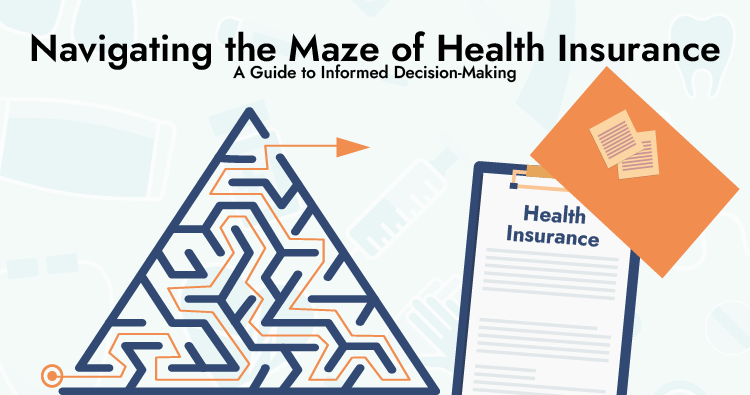

Navigating the Maze of Health Insurance: A Guide to Informed Decision-Making
Ever heard the old saying, "Health is Wealth"? I'm guessing you've heard it plenty of times, right? It's a mantra we're all familiar with, yet too often, we put our health on the back burner. We're aware that maintaining a good diet, keeping those gym dates, and not missing those regular health check-ups are stepping stones to a healthy life. So, why do we overlook health insurance?
Now, imagine this: you're right in the midst of a medical situation and the last thing you want to be fussing over is where the money's gonna come from. That's where health insurance steps in. Considering the escalating medical costs, having a safety net to cover those unexpected bills isn't just a smart move, it's necessary.
So, what's the right health insurance plan for you? Would the individual or family floater plan suit your needs better? Let's dive in and flesh out some of the important differences between these two options so you can make an informed choice.
Let me break it down for you. Individual health insurance, like its name implies, is all about you. It provides coverage solely to the policyholder. None of the premiums paid or the assured sum can be shared with anyone else.
On the other hand, family floater insurance spreads its wings over all family members under the same policy. This means that both the insurance premium and the assured sum can be sliced and shared among the entire family.
As for coverage, under individual health insurance, the person who's footing the bill is the only one covered. Here's an illustration: you've got a policy for Rs. 5 lakhs. The health insurance folks will only cover your medical bills.
Now, under a family health insurance plan, it's one for all and all for one. Let's say you've got yourself a policy for Rs 5 lakhs, covering you, your partner, and your little one. This coverage sum, i.e., Rs. 5 lakhs, is a shared resource among all the covered family members.
But what suits whom? Well, an individual health insurance policy is a snug fit for folks with specific health needs and is particularly beneficial for the older folks.
A family plan, on the other hand, seems the way to go for couples or small families without any elderly members. Why? The steep premiums for senior citizens make picking an individual policy for their special health considerations a practical choice.
The pros of going for an individual plan lie in having a set coverage amount only for you and being able to claim full coverage for your risks.
The perk of family floater plans is that the premiums are kinder to the wallet compared to their individual counterparts, sparing you the trouble of juggling numerous individual policies.
Of course, nothing's perfect. Individual health insurance plans can be rigid and come with premiums that pack a punch.
Family floater plans, notwithstanding their seeming charm, can trip up with insufficient coverage for the whole family. Plus, the likelihood of filing a claim under such plans is higher; which means you might wave goodbye to the no-claim bonus. No gibberish, here's what that means - if anyone in your family files a claim during the year, you can't avail the no-claim bonus.
Another hiccup with family floaters - if your kids hit a certain age bracket (18-25 years, policy depending), they won't be included in the coverage of the family health insurance plan.
So, what's the magic formula? No such thing, I'm afraid. The golden ticket one-size-fits-all policy just doesn't exist. Premiums payable and risks covered are just a couple of factors that come into play.
It's worth looking into individual policies if you can swing the financial side of things. Not only do they cater to your personal health needs, but they also score you a no-claim bonus. That means either more coverage or less premium if you keep claims at bay for a year.
If you're fortunate enough not to have a bad medical history, can't shell out big bucks on premiums, or don't have an elderly person in your family, then family plans might be the way to go.
Before you commit to any plan, be it individual or family insurance, weigh up the pros and cons. Factor in things like health risks, the number of family members, their ages, and the extent of policy coverage.
The right policy for you is the one tailor-made to your unique needs. But remember, please don't skimp on health insurance – it's absolutely invaluable!
This blog is purely for educational purposes and not to be treated as personal advice. Insurance is a subject matter of solicitation.
Tags :
C – 301, Green Acres Phase 1,
Ghodbunder Road, Waghbil,
Thane W, Pin - 400615
+91 9833542239
+91 9619903590
Privacy Policy
Maxima Ventures LLP © 2022 | Designed & Developed By : www.anchoredge.in